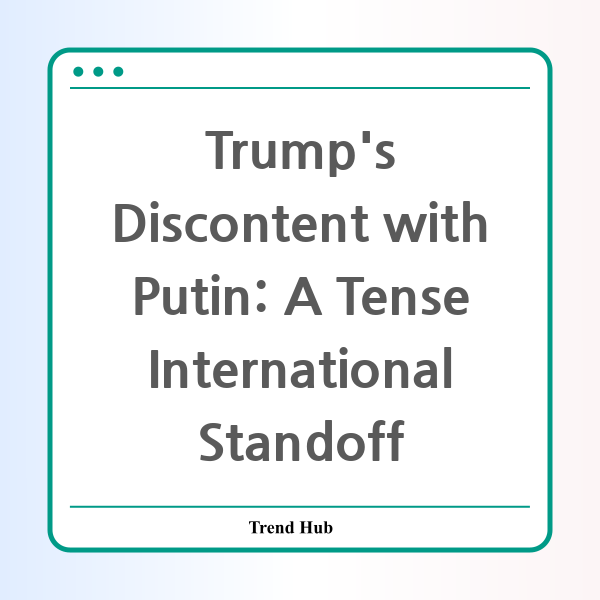* This website participates in the Amazon Affiliate Program and earns from qualifying purchases.

In an increasingly volatile international landscape, former President Donald Trump is voicing his discontent with Russian President Vladimir Putin. As tensions escalate due to Russia's ongoing aggression in Ukraine, Trump's criticism comes amidst considerations of potential sanctions against Moscow. This situation raises several questions about the future of U.S.-Russia relations and the broader implications for global peace.
Recently, Trump referred to Putin as "playing with fire" amidst fears that his actions could jeopardize international stability. The former president's comments were made in response to a significant escalation in violence, including a series of drone and missile strikes by Russia on Ukrainian cities, resulting in civilian casualties. Trump's disappointment was palpable as he lamented the timing of these attacks, stating, "I'm very disappointed at what happened a couple of nights now where people were killed in the middle of what you would call a negotiation."
This high-stakes game of diplomacy comes at a time when many in the U.S. are calling for stronger sanctions on Russia. However, Trump has expressed reluctance to impose these sanctions if it could potentially derail any promising negotiations towards peace. He indicated that while he sees the urgency of addressing Putin's tactics, he is also mindful of the delicate balance required to foster dialogue between the warring factions.
In a social media post, Trump described Putin as "absolutely crazy," highlighting the former president's frustration with the current state of negotiations. He firmly believes that his previous leadership prevented significant escalations that could have resulted in severe consequences for Russia. This creates a complex narrative where Trump positions himself as a potential mediator, albeit one who has strong opinions on Putin's conduct.
On the other hand, the Kremlin's response has been dismissive, suggesting that Trump's comments stem from a lack of comprehensive understanding regarding the dynamics of the conflict. A spokesperson from the Russian government has implied that the former president is not privy to the full scope of intelligence regarding Ukraine's military actions against Russia. This response emphasizes the broader communication gap that exists between the two countries, further complicating any potential diplomatic resolutions.
As the situation unfolds, the focus remains on the potential for a peace memorandum promised by Putin to Trump. The uncertainty surrounding the signing of such a document reflects the broader unpredictability of the conflict and raises questions about the sincerity of Russia's intentions. Ukrainian officials have voiced skepticism, suggesting that while Russia engages in discussions, actual military actions continue unabated.
Looking ahead, it becomes clear that the delicate nature of U.S.-Russia relations could define the geopolitical landscape for years to come. Trump's unique position allows him to rally attention around this issue, yet his ability to influence the outcomes remains uncertain, especially given the complexities involved. The next few weeks are critical, not only for the fate of Ukraine but also for the future of international diplomacy.
In conclusion, Trump's criticisms of Putin signal a striking tension in international relations and highlight the challenges faced in negotiating peace. As both nations navigate this turbulent terrain, the world watches closely, hoping for a resolution that could pave the way for stability in Eastern Europe.
* This website participates in the Amazon Affiliate Program and earns from qualifying purchases.